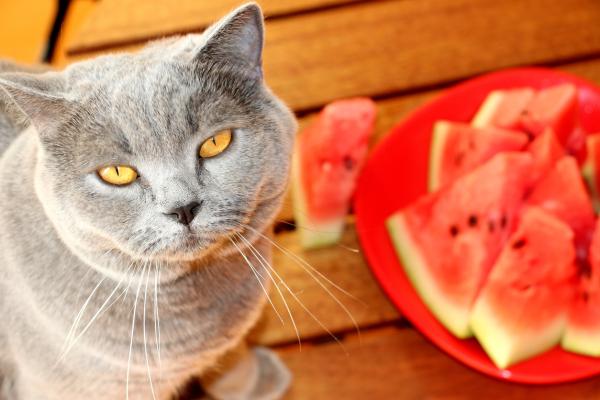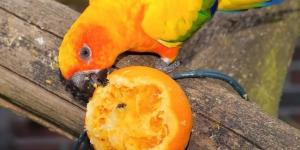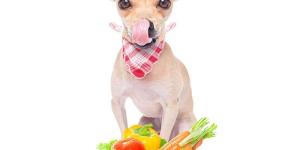Fruit and Vegetables Cats Can't Eat



See files for Cats
It can be difficult for us as people to eat the correct amount of fruit and vegetables. They are very important sources of various nutrients we require to stay alive. Many of us apply this same rationale to our felines, but to do so is a mistake. Cats are obligate carnivores and need the vast majority of their nutrition from animal protein. This most commonly is in the form of meat and fish. A little fruit and vegetables can help supplement their nutrition or at least provide an enjoyable treat. Too much can cause gastrointestinal upset. However, some fruit and vegetables can be toxic for cats. The results of their can have serious consequences for their health.
At AnimalWised, we provide a list of fruits and vegetables cats can't eat. We explain why these foods are bad for cats and what health risks their consumption can cause our felines.
Are fruit and vegetables bad for cats?
As stated in the introduction, cats are obligate carnivores. Their organism is such that they require nutrients which can only be found naturally in food derived from animals, specifically meat and fish. Their diet requires them to eat a majority of animal protein, a moderate amount of fat and a low amount of carbohydrates. They also require certain nutrients and organic compounds which they cannot synthesize naturally, such as taurine, which is derived from animals.
Fruit and vegetables are low in protein and generally low in fat, but can be high in carbohydrates in the form of sugars. Avocado is a rare exception of a fruit which is also high in fat. Due to high concentrations of nutrients they don't require and low concentrations of the nutrients they do need, eating too much fruit and vegetables will be bad for them. At best, they will provide empty calories, at worst they will make them nutritionally deficient.
However, some small portions of fruit and veg for cats can provide some benefit. There are vitamins and minerals found in certain fruit and vegetables which cats cannot synthesize naturally. Roughage in some fruit and veg can also help cats, especially if they have digestive problems. We will always need to be careful, however. Although high-fiber content can be a positive, it may be negated by a similarly high-sugar content.
You may notice your cat shows interest in eating fruit and vegetables found in the home. Although cats cannot actually taste sweetness to the same degree as other animals, they may still enjoy the freshness of these foodstuffs. For this reason, small portions of fruit and or vegetables may be a good way to provide our cat with a sporadic treat.
Fruit and vegetables toxic to cats
Although domestic felines should avoid a diet with high fruit and vegetable content, there are some fruit and vegetables they need to avoid altogether. This is due to toxic compounds which may be found in their skin, flesh or even their seeds or pits. Although the cat may not want to eat the seeds, they may ingest them accidentally or break them open when playing.
Many vegetables and fruits are bad for cats, but they are only toxic in large amounts. Fortunately, many cats will refuse to eat some of these fruit and vegetables, but we always need to be careful. It could be they are found in other food products, especially in concentrated form. If a cat was to eat toxic fruit or vegetables, they can develop food poisoning. Symptoms of intoxication in cats include:
- Hypersalivation
- Vomiting
- Diarrhea
- Increased water consumption
- Loss of appetite
- Lack of coordination
- Abdominal pain
- Pupil dilation
- Increased heart rate
- Breathing difficulties
- Yellowish mucus membranes
- Seizures
- Shock
The severity of the symptoms will depend on the toxicity and amount of the food consumed. If we see any of the above symptoms and fear they may have been intoxicated, we should take them to a veterinarian immediately. Although eating the wrong food is dangerous, you should also be concerned if your cat is not eating as it may be related to various diseases.
Fruit cats can't eat
In small quantities, many fruits can be consumed by cats without problem. There are some that could cause harm, especially if eaten in large amounts. The fruits considered toxic to cats include:
Avocado
Its high fat content makes it a forbidden fruits for cats. The result of its ingestion can be a disease called pancreatitis, i.e. an inflammation of the pancreas. Another problem is due to a fungicidal toxin known as persin. This is found in low amounts in the flesh, but is highly concentrated in the skin and the pit. Its consumption is associated with severe gastrointestinal disorder, but fortunately occurs rarely in cats.
Grapes, raisins and currants
Grapes and currants are harmful to cats, as is their dried forms such as raisins or sultanas. They are highly toxic to cats and consumption can lead to acute kidney failure and even death. This can occur with only consuming a relatively small amount. For this reason, not only should we never give this fruit to cats, we should ensure they do not have access to them in the home.
Oranges, lemons, tangerines and grapefruit
Citrus fruits such as oranges, lemons, tangerines or grapefruit are considered harmful fruits for cats. This is due to their acidity, which is what can cause gastric irritation. Fortunately, they are not fruits that these animals are particularly attracted to.
Apples, peaches, plums, pears and cherries
The flesh of an apple is a healthy fruit for cats, but we include it in the list because its seeds contain substances capable of generating cyanide. Specifically, cyanide inhibits an enzyme that is necessary for the transport of oxygen between cells. Therefore, if we offer it to cats, we need to ensure there are no seeds or even apple tree leaves present. This same problem is also caused by the stones of other fruits, such as peaches, nectarines, plums, pears, cherries or apricots.
If cats suffer from kidney failure, their diet will need to be amended. Take a look at our article on recipes for cats with kidney disease to learn more.
Vegetables cats can't eat
Many of the vegetables we consume as part of a balanced diet are also perfectly suitable for cats. There are some which are toxic for various reasons and are best avoided. In particular, you need to be careful with the following:
Onions and garlic
Both onion and garlic contain a substance called triosulfate. This is related to the appearance of hemolytic anemia, a problem due to the rupture of red blood cells that can lead to the death of a cat. For this to happen to our cat, they would have to consume large amounts or smaller doses over a long period of time. Also, onion and garlic can cause diarrhea and vomiting. Leeks, shallots and spring onions also contain triosulfate and are therefore included in the list of prohibited vegetables for cats.
Potatoes
Potato is a tuber that contains solanine, which is toxic to cats, as well as to people and dogs. The good news is that it can be removed by cooking. For this reason cats can ingest cooked potato, but in small quantities. This is because the potatoes have high carbohydrate content. Also, the cooked potato needs to be plain and salt, fat and spices can cause them harm.
Tomatoes
Although they do not look like a potato, they are from the same family of plants known as Solanaceae (nightshades). For this reason, tomatoes also contain solanine when they are not yet fully ripe and can be harmful to cats. Care must also be taken with the plant, because if the cat has access, they could chew it and ingest its leaves or stems, which also contain solanine.

Can a cat be a vegetarian?
Many guardians do not eat food derived from animal products, but also have cats in their home. It is understandable that they may not want to feed animal protein to a cat if they want to avoid animal cruelty. Unfortunately, as described above, cats are obligate carnivores. They require nutrients derived from animals to survive.
There are some studies which propose plant-based alternatives for cats, but they have yet to yield conclusive outcomes. You can purchase vegan food for cats, but it will need to have synthetic supplements which can be difficult to introduce into a cat's diet. For a cat's health, it is best to provide them a high-quality feed derived from animal protein.
If you want to read similar articles to Fruit and Vegetables Cats Can't Eat, we recommend you visit our Homemade diets category.





